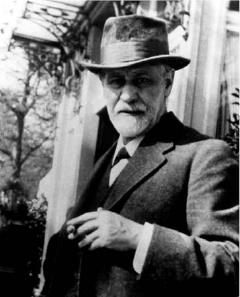Behaviorism is a school of psychology that attempts to explain human behavior in terms of responses to environmental stimuli. Influenced by the conditioned reflex demonstrated by Russian physiologist Ivan Pavlov (1849–1936), American psychologist John Broadus Watson (1878–1958), of Johns Hopkins University, codified and popularized the theory, which discards introspection and consciousness as influences on human behavior. Behaviorism was further studied by another American psychologist and Harvard professor B. F. Skinner (1904–1990). Skinner focused his work on patterns of responses to observable stimuli (versus unobservable stimuli such as introspection and conscience) and external rewards. Applied to human learning, Skinner’s theories on behaviorism affected educational methods, which tangibly reward good behavior.

Sigmund Freud (pictured in 1920) believed that human behavior and all mental states are influenced by repressed and forgotten impressions, many from childhood.

